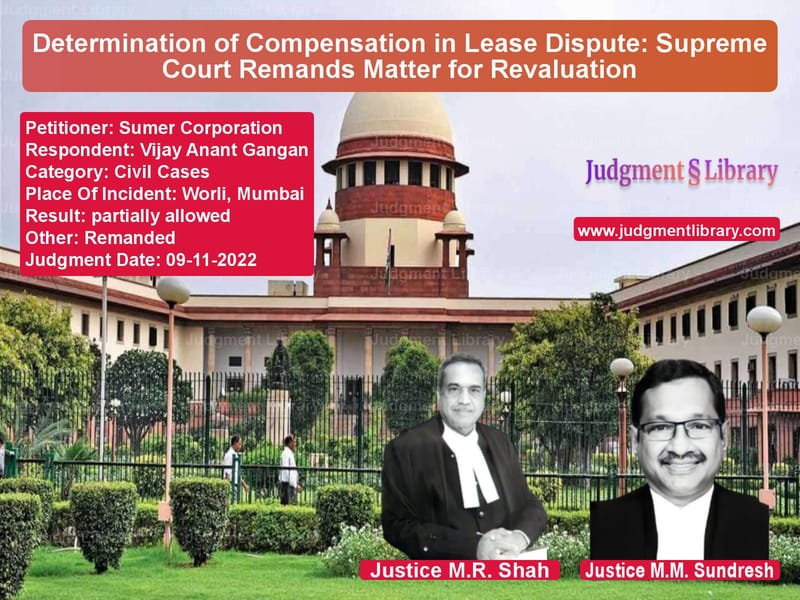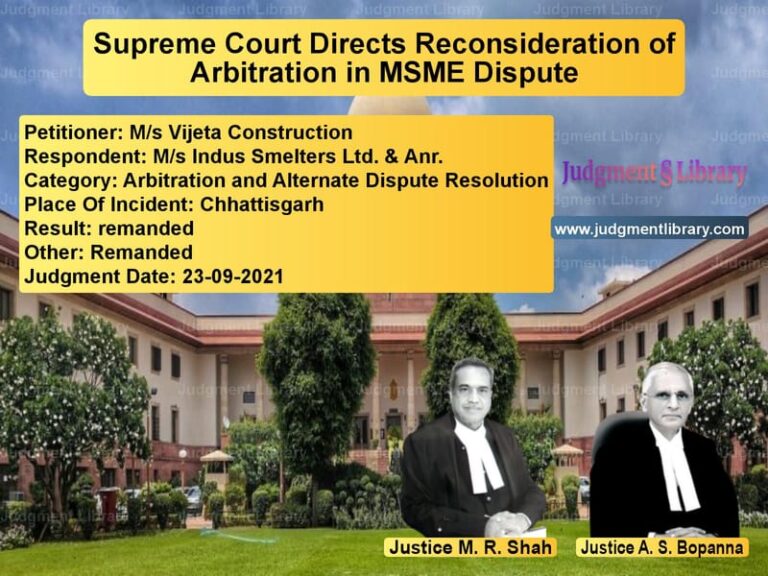Determination of Compensation in Lease Dispute: Supreme Court Remands Matter for Revaluation
The Supreme Court of India recently delivered a pivotal ruling in Sumer Corporation v. Vijay Anant Gangan & Ors., which revolved around the determination of compensation in a long-running property dispute in Mumbai. The case primarily dealt with the issue of compensation for the use and occupation of leased premises by the tenant during the pendency of an eviction decree. The appellant, Sumer Corporation, contested the compensation amount set by the High Court, arguing that it was too low and not reflective of the market value of the property.
Background of the Case
The property in question is located in Worli, Mumbai, a prime area in the heart of the city. The property was originally leased in 1949 for 30 years, and after various legal developments, the lessee sought to demolish the existing structures to build new ones. In 1968, a supplementary lease agreement was executed for a period of 98 years. However, after the original lessee’s death in 1987, the legal heirs of the original lessor initiated eviction proceedings against the current tenants.
In 2004, the Trial Court dismissed the suit, but the Appellate Bench of the Small Causes Court overturned this decision in 2017, ordering the eviction of the tenants. During the pendency of the revision application before the High Court, the appellant (Sumer Corporation), claiming ownership of the property through a registered deed of conveyance, was added as a party. The High Court stayed the eviction order but imposed a monthly compensation of Rs. 2,50,000 for the use and occupation of the property.
Legal Issues Before the Court
The Supreme Court had to address the following legal issues:
- Whether the High Court’s determination of compensation was reasonable given the market value of the property.
- Whether the methodology used by the High Court to calculate compensation was correct.
- Whether the appellant’s valuation report was appropriately considered by the High Court.
Petitioner’s Arguments
The appellant, Sumer Corporation, contended that:
- The High Court’s calculation of compensation was based on an untenable methodology.
- The compensation amount of Rs. 2,50,000 per month was insufficient, given that the property is located in a prime area in Worli.
- The valuation report of Mr. Maniyar, which suggested that the compensation should have been Rs. 67,76,038 per month, was disregarded by the High Court without proper justification.
- Determining compensation based on the purchase price of Rs. 5.50 crore for the property in 2008 was not an appropriate method, as it ignored the market realities at the time of eviction.
- As per legal precedents such as Atma Ram Properties (P) Ltd. v. Federal Motors (P) Ltd. (2005) 1 SCC 705, compensation should reflect the rental income the landlord would have earned from the property.
Respondent’s Arguments
The respondent, Vijay Anant Gangan, argued that:
- The High Court had rightly calculated compensation by considering a fair return of 6.5% per annum on the purchase price of the property, which is a standard approach.
- The valuation report of Mr. Maniyar was flawed because it relied on the Ready Reckoner rate of land and the permissible Floor Space Index (FSI), which was not reflective of the actual compensation due.
- The compensation fixed by the High Court at Rs. 2,50,000 per month was reasonable, given the property’s circumstances and the prevailing market conditions.
- Further recalculating the compensation as per the appellant’s claims would unjustly inflate the amount and be in violation of settled legal principles.
Supreme Court’s Observations
The Supreme Court reviewed the arguments from both sides and made several observations:
- The methodology adopted by the High Court for determining compensation was flawed, as it relied on the purchase price of the property in 2008 and a return rate of 6.5% annually.
- The Court agreed with the appellant’s argument that the compensation should reflect the rent the landlord would have earned if the tenant had vacated the premises, and not merely the market value of the property.
- As per established law, including Atma Ram Properties and Super Max International Pvt. Ltd., compensation for use and occupation should be determined based on the potential rental income, not the property’s purchase price or market value.
- The Supreme Court also noted that the compensation must not be excessive or punitive, and should be determined reasonably based on the actual rental market.
Supreme Court’s Verdict
The Supreme Court delivered its verdict, quashing the High Court’s order and remitting the matter back for fresh determination of the compensation amount. The Court observed:
- “The High Court’s approach in determining the compensation based on the purchase price of the property and annual returns is not consistent with the established legal principles.”
- “The matter is remitted to the High Court to determine compensation afresh, taking into account the rent the lessor could have earned had the tenant vacated the premises.”
- “The High Court is required to consider the valuation report submitted by the appellant and determine compensation based on market rental value, not on the property’s purchase price.”
- “The parties may lead fresh evidence regarding the prevailing market rent at the time of the eviction decree.”
Key Takeaways from the Judgment
- Determination of Compensation: The Court clarified that compensation for use and occupation should reflect the fair rental value of the property, not the property’s market value or purchase price.
- Compensation for Use and Occupation: The ruling reinforces the principle that the tenant should pay mesne profits at the rate the landlord would have received from renting out the premises.
- Proper Consideration of Valuation Reports: The Court emphasized that valuation reports should be properly considered and weighed while determining compensation, rather than relying on generalized formulas or outdated approaches.
- Reasonable Compensation: The Court underscored that compensation must be reasonable, reflecting the market reality, and not inflated based on purchase price or speculative calculations.
Implications of the Judgment
The Supreme Court’s ruling has far-reaching implications for property law in India, especially in cases involving eviction and compensation:
- It ensures that compensation for the use and occupation of a property is based on realistic and fair market rentals, thus protecting both landlords and tenants from unfair demands.
- It sets a precedent for how compensation should be calculated in the context of eviction orders and the interim period before the final settlement of such disputes.
- It affirms that property valuations should take into account the actual rental market conditions, rather than being influenced by the historical purchase prices of properties.
Conclusion
The Supreme Court’s decision in Sumer Corporation v. Vijay Anant Gangan serves as a critical precedent in determining fair compensation in property disputes. By remitting the matter to the High Court for fresh calculations, the Court has ensured that compensation for tenants’ continued occupation is based on the actual market value of the land for rental purposes. This judgment strikes a balance between protecting the rights of property owners and ensuring that compensation remains reasonable and fair.
Read also: https://judgmentlibrary.com/supreme-court-remands-property-dispute-for-fresh-consideration/
Petitioner Name: Sumer Corporation.Respondent Name: Vijay Anant Gangan.Judgment By: Justice M.R. Shah, Justice M.M. Sundresh.Place Of Incident: Worli, Mumbai.Judgment Date: 09-11-2022.
Don’t miss out on the full details! Download the complete judgment in PDF format below and gain valuable insights instantly!
Download Judgment: sumer-corporation-vs-vijay-anant-gangan-supreme-court-of-india-judgment-dated-09-11-2022.pdf
Directly Download Judgment: Directly download this Judgment
See all petitions in Contract Disputes
See all petitions in Property Disputes
See all petitions in Damages and Compensation
See all petitions in Judgment by Mukeshkumar Rasikbhai Shah
See all petitions in Judgment by M.M. Sundresh
See all petitions in partially allowed
See all petitions in Remanded
See all petitions in supreme court of India judgments November 2022
See all petitions in 2022 judgments
See all posts in Civil Cases Category
See all allowed petitions in Civil Cases Category
See all Dismissed petitions in Civil Cases Category
See all partially allowed petitions in Civil Cases Category







